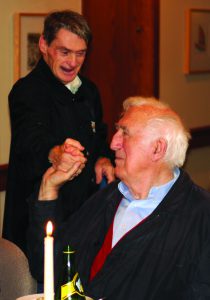
Jean Vanier (right) with John Smeltzer, a member of L’Arche Daybreak.
By Courtney Lott –
The first time my friend’s son met my eyes and asked me my name, I almost broke down into an ugly cry in the church foyer. He was around ten-years-old at the time and is autistic. Before I got to know this young man, before I taught him and his siblings swim lessons, before I saw his voracious desire to read anything he could put his hands on, I’m sad to say I probably would have categorized him as weird. Maybe I would have qualified that he was a blessing, but this would have been attached to a series of assumptions about him based on his differences.
I’m grateful for the opportunity I’ve had to get to know him, but I’m afraid others share the hang-ups I used to have. Though we are a far cry from hiding people with intellectual disabilities away in asylums, our churches often struggle to include them in our services, much less our community life.
This is one of the many reasons Jean Vanier began the L’arche community. After witnessing the sadness of one of the French asylums in 1964, Vanier purchased a small home and invited two of the men from the institution to come live with him. This safe haven grew quickly and, in 1968, Vanier was invited to host a retreat in Canada. As a result, he received an offer to start a similar home in Richmond Hill, just north of Toronto, thus starting L’Arche Daybreak.
“What was clear,” Vanier writes in An Ark for the Poor: The Story of L’Arche, “from the very beginning was the aspect of ‘living with’ people who have [intellectual disabilities], a desire to create family with them.”
From there, they expanded across the world, welcoming individuals from multiple religious backgrounds and traditions. Each community roots itself in faith. While some homes focus on a single religion, others are a mixture, and all are welcome whether they ascribe to a certain faith or not. All L’Arche communities strive to develop unity and family.
“Without this spiritual dimension and growth in holiness, L’Arche could become simply another group home,” writes Vanier. “It would lose what makes it unique.”
Through the retreats Vanier continued to offer, countless others were inspired to begin their own communities in which people live and work together. To date, there are 147 such homes, 18 of which are located in the United States.
Striving to live out their mission to “make known the gifts of people who have intellectual disabilities,” L’Arche employees and volunteers work to provide support and guidance unique to each individual’s needs. Those with disabilities who are a part of L’Arche have the ability to live independently or in a household with others and participate in activities and work programs. Together they build relationships, strive for unity, and build a strong sense of home.
L’Arche seeks to help those who are often overlooked in our society. Though they can’t welcome everyone who has a disability, they seek to serve as a sign that a truly human society must be founded on “welcome and respect for the weak and downtrodden.” Such a sign is a powerful reminder to the rest of the world of the dignity God has endowed all individuals, no matter their apparent limitations.
No comments:
Post a Comment